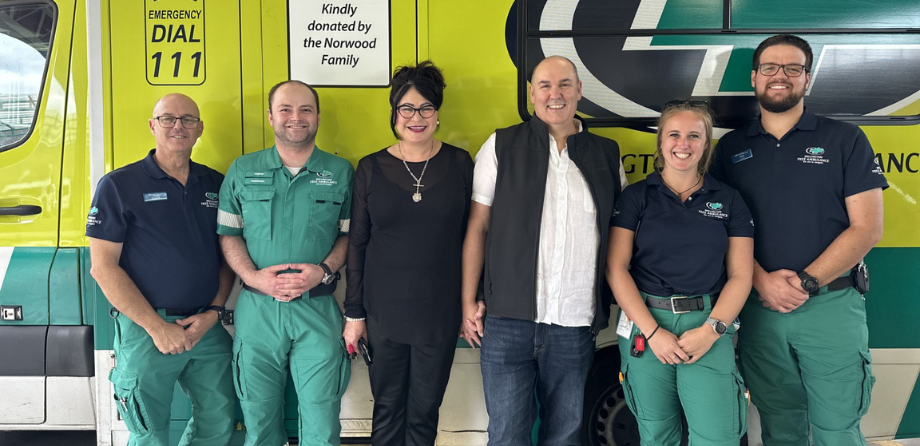About us
Our news
Barry’s story – “Everything had to go right that day, and I’m so grateful it did”
Barry’s story – “Everything had to go right that day, and I’m so grateful it did”
 20 October 2025
20 October 2025
Barry and his wife had just returned from a visit to Christchurch when his life suddenly took a dramatic turn. A sudden cardiac arrest right there in the Wellington Airport terminal. Thanks to the quick actions of bystanders, airport staff, and Wellington Free Ambulance paramedics, Barry’s story is one of survival, recovery, and inspiration to others to learn CPR and AED skills.
Barry and his wife had spent a couple of days visiting family in Christchurch. “It was just a normal family visit,” Barry recalls. When they landed back in Wellington, Barry was feeling a bit tired from a walk earlier in the day but nothing alarming. “No chest pain or anything cardiac,” he says. Then, without warning, he collapsed.
Barry has no memory of what happened at the airport after that moment. “My last clear memory was arriving at Christchurch Airport, about two hours before the cardiac arrest.” What happened next, he learned from the responders who saved his life.
Help arrives immediately
Barry’s wife was right by his side and called out for help. A bystander dialed 111, and the Air New Zealand crew quickly fetched a defibrillator that was very close by. Airport operations staff arrived as well and one of them started CPR while others prepared the defib.
The Fire and Emergency team was first on scene, followed closely by the paramedics who took over care within minutes. Barry recalls: “I received about 28 shocks altogether between the defibrillator at the airport and the ambulance.” He even jokes, “The CPR was so good it broke seven ribs!”
A critical care paramedic brought in a LUCAS CPR machine which performs automatic chest compressions so the team could focus on other lifesaving treatments. Barry was intubated and sedated to try and restart his heart and keep him stable.
Even in the ambulance, Barry had another cardiac arrest and needed more shocks. The team kept going until he was finally in a stable rhythm.
Recovery and discovery
Barry was taken to the intensive care unit, where doctors cooled his body to protect his brain and sedated him to give him the best chance of recovery. The next day, he was slowly waking up but initially confused and unaware of what had happened.
Over the following week, Barry underwent extensive tests. Doctors discovered he had multiple blockages in his arteries and needed a quadruple bypass surgery. After the surgery, Barry spent nearly a month in hospital recovering.
A healing connection

Paramedics David, Hamish, Janna and Nick, part of the team who saved Barry's life, met Barry and his wife when they visited our Thorndon Ambulance Station.
One of the most meaningful moments for Barry was meeting the paramedics who saved his life. “My wife and I went to the Thorndon Ambulance Station and met the paramedics who explained everything that had happened. It was really healing because I had no memory of the event and could finally fill in the blanks.”
Before his cardiac arrest, Barry admits he didn’t really know much about AEDs. “Now, I notice those yellow and green boxes everywhere and understand how crucial they are.” He feels incredibly lucky everything aligned that day, from being near an AED to having skilled people around who could help.
Passing it on
Since his recovery, Barry has done CPR training with his whole family. “It was super easy and even fun! Nick from Wellington Free Ambulance came to teach us. I really encourage everyone to learn CPR, you never know when you might need it.”
Barry and his wife are deeply grateful to the paramedics for their dedication, skill, and ongoing support. “They cared for me and my wife during such a stressful time and have followed up with me several times since. I can’t thank them enough.”
One memory Barry holds close is waking up in the hospital to find one of the paramedic crew besides his bed, wanting to know how he was doing. “That really stuck with me, they invested so much into getting me back.”
Barry’s advice
“Take advantage of resources out there. Do CPR and AED training, it’s simple but can save lives. For me, everything had to go right that day, and I’m so grateful it did.”
If you want to learn CPR and how to use an AED, Wellington Free Ambulance offers free training sessions through The Lloyd Morrison Foundation Heartbeat Programme.